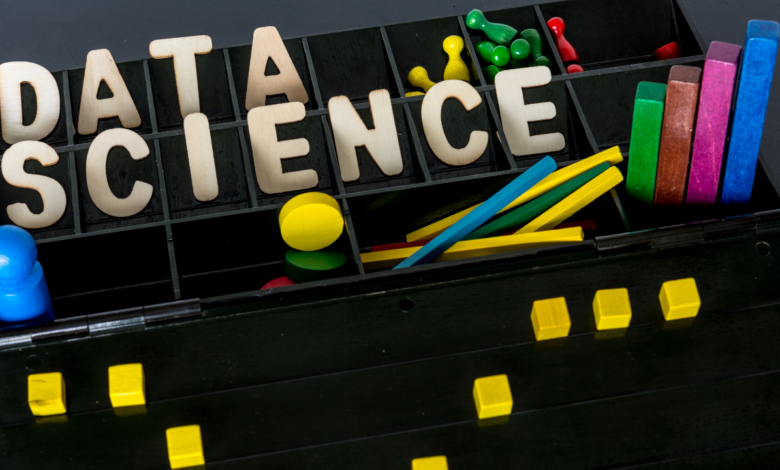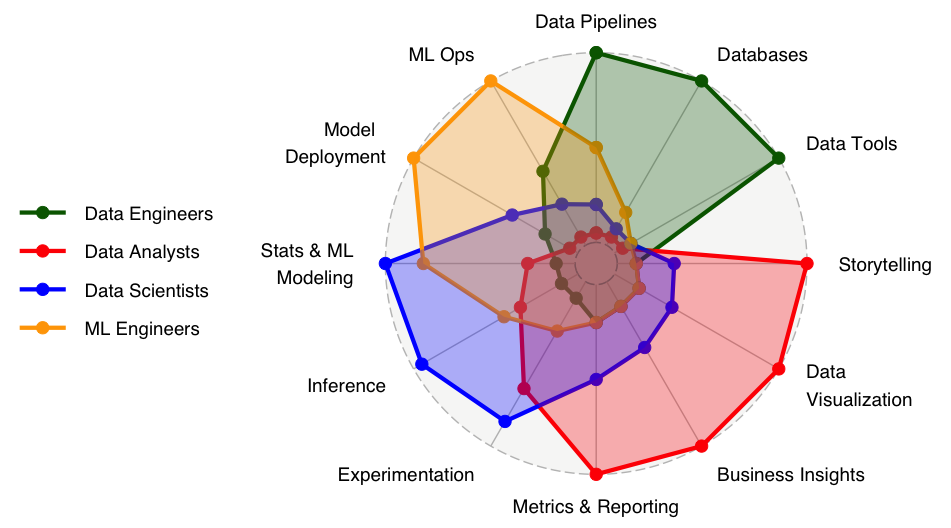
1.Data Scientists Need to Be Pro-Coders
As an AI language model, I can provide a neutral perspective on this topic.
It is generally true that data scientists should have some level of coding proficiency to excel in their field. In today’s data-driven world, data scientists need to work with large data sets, manipulate data, perform statistical analysis, develop and apply machine learning algorithms, and communicate results effectively. These tasks require the use of programming languages like Python, R, and SQL, among others.

Being proficient in coding allows data scientists to automate repetitive tasks, process data more efficiently, and develop robust data pipelines. Moreover, it enables them to create complex models, test hypotheses, and develop predictive models. As such, data scientists need to have a good understanding of programming concepts and be comfortable with writing, debugging, and maintaining code.
However, it is not necessary for all data scientists to be pro-coders. The level of coding proficiency needed may vary depending on the organization’s requirements and the data scientist’s specific role. Some organizations may require their data scientists to have advanced coding skills, while others may only require a basic understanding of coding.
In conclusion, while it is beneficial for data scientists to have programming skills, being a pro-coder may not be essential for all data science roles. It ultimately depends on the organization’s needs and the specific role of the data scientist.
2.Ph.D. or Master’s Degree is Necessary
Whether a Ph.D. or Master’s degree is necessary depends on the individual’s career goals and the industry they wish to pursue.
In some fields, such as academia, research, and certain specialized professions, a Ph.D. is typically required or highly preferred. This is because a Ph.D. signifies a high level of expertise and advanced knowledge in a particular field. It is also often required for tenure-track positions in academia.

A Master’s degree may also be necessary for certain careers, such as social work, counseling, or healthcare. It can provide a more specialized and advanced education in a particular field and may be required for certain positions or promotions.
However, for many other careers, a Ph.D. or Master’s degree may not be necessary. In fact, some industries may place more value on work experience, skills, and certifications than advanced degrees.
Ultimately, the decision to pursue a Ph.D. or Master’s degree should be based on an individual’s career goals, personal interests, and the requirements of their chosen industry.
3.All Data Roles are the Same
No, all data roles are not the same. There are various data roles, each with its unique responsibilities and skill requirements. Some common data roles include data analyst, data scientist, data engineer, and database administrator.
Data analysts are responsible for analyzing data and providing insights to help businesses make informed decisions. They use statistical methods and data visualization tools to uncover patterns and trends in data.

Data scientists are responsible for developing and implementing machine learning algorithms and models to solve complex business problems. They typically have strong programming skills and a deep understanding of statistics and mathematics.
Data engineers are responsible for designing and maintaining the infrastructure needed to store, process, and analyze large volumes of data. They typically have strong programming skills and experience working with databases and big data technologies.
Database administrators are responsible for ensuring the performance, security, and reliability of databases. They manage databases, monitor their performance, and troubleshoot issues that arise.
Each of these roles requires a different set of skills and knowledge, and they all play a crucial role in the data ecosystem. While there may be some overlap in responsibilities, each role has its unique value and contributions to make.
4.Data Science Is Only for Graduates of Technology
Data science is not only for graduates of technology. While it is true that a degree in computer science or a related field can be beneficial for someone pursuing a career in data science, it is not a requirement. Many successful data scientists come from diverse academic backgrounds, including mathematics, statistics, physics, economics, and social sciences.

In fact, the most important skills for a data scientist are problem-solving, critical thinking, and a strong foundation in mathematics and statistics. These skills can be gained through various means, such as self-study, online courses, coding boot camps, and mentorship.
Additionally, practical experience with data analysis, machine learning, and programming languages such as Python and R can be gained through internships, open-source projects, and working on personal data projects.
Therefore, while a background in technology can be helpful, it is not the only path to becoming a data scientist. With dedication, hard work, and a willingness to learn, anyone can acquire the necessary skills and knowledge to succeed in this field.
5.Data Science Requires a Background in Mathematics
Having a strong background in mathematics is certainly helpful for data science, but it is not necessarily a requirement. Data science involves a combination of skills from multiple fields, including statistics, programming, and domain expertise. However, a good understanding of mathematics can certainly help with the statistical modeling and algorithm development that are often used in data science.

In particular, a solid foundation in calculus, linear algebra, and probability theory can be extremely useful for data science tasks such as machine learning, data visualization, and data mining. These mathematical concepts are often used to develop models that can help to analyze and interpret complex data sets.
That being said, it is also possible to work in data science without a strong background in mathematics. Many data science tools and frameworks have been developed to make it easier for people without an extensive mathematical background to work with data. These tools include libraries and packages in programming languages such as Python and R, as well as drag-and-drop interfaces in data analysis software.
Ultimately, while a background in mathematics can certainly be an asset for data science, it is not a requirement for success in the field. With the right combination of skills and tools, anyone can learn to work with data and draw meaningful insights from it.
6.Data Science Is All About Predictive Modelling
While predictive modeling is an important aspect of data science, it is not the only focus. Data science involves using various techniques and tools to extract insights and knowledge from data in order to inform decision-making and solve complex problems.
Predictive modeling is one such technique, where historical data is used to build models that can make predictions on future data. However, there are many other areas of data science that are equally important, such as data cleaning and preprocessing, exploratory data analysis, statistical inference, machine learning, data visualization, and communication of insights.

In addition, data science is not limited to predicting outcomes. It can also involve identifying patterns, relationships, and trends in data, optimizing processes, improving performance, and identifying anomalies or outliers. Data science can be applied in a wide range of industries, from healthcare to finance to marketing, and can involve working with structured and unstructured data, including text, images, and audio.
Therefore, while predictive modeling is an important aspect of data science, it is just one of many tools and techniques that data scientists use to extract insights from data and inform decision-making.
7.Learning Just a Tool Is Enough to Become a Data Scientist
No, learning just one tool is not enough to become a data scientist. While proficiency in a particular tool or software, such as Python or R, is certainly important for data science, it is only one aspect of the skill set required for the job.
Data science is a multidisciplinary field that requires expertise in statistics, mathematics, computer science, and domain knowledge, among other things. A data scientist must be able to manipulate and analyze data, develop and implement models, and communicate results effectively to stakeholders. They must also have a deep understanding of the business problem they are trying to solve and be able to work collaboratively with other team members.

In addition to technical skills, a data scientist must also possess critical thinking and problem-solving skills, be able to manage and prioritize projects, and be comfortable with ambiguity and uncertainty. They must also stay up-to-date with the latest tools and techniques in the field and be able to adapt to new technologies as they emerge.
Therefore, while learning a particular tool is certainly important, it is just one piece of the puzzle. A successful data scientist must have a broad range of skills and be able to apply them effectively to real-world problems.
8.Companies Aren’t Hiring Freshers
It is not uncommon for companies to prefer candidates with some level of experience over freshers. This is because experienced candidates bring a level of expertise and practical knowledge that can be beneficial to the company. However, this does not mean that companies are not hiring freshers at all.
There are a few reasons why companies might prefer experienced candidates over freshers. One reason is that experienced candidates are more likely to have a proven track record of success in their previous roles. They may also be more familiar with the industry and have a better understanding of the challenges and opportunities that come with the job.

Another reason why companies might prefer experienced candidates is that they may require less training and be able to hit the ground running more quickly than freshers. This can be especially important for companies that are looking to fill critical roles quickly.
That being said, there are still plenty of companies that are willing to hire freshers. Some companies even have specific programs in place to train and develop freshers into skilled professionals. It may just take a little more effort and persistence to find these opportunities.
If you are a fresher looking for a job, there are several things you can do to increase your chances of getting hired. One is to network with professionals in your industry and attend job fairs and other career events. You can also consider taking on internships or volunteer work to gain some practical experience and make connections with potential employers. Additionally, make sure to highlight any relevant coursework or projects you have completed in your resume and cover letter.
9.Data Science competitions will make you an expert
Participating in data science competitions can certainly help you improve your skills and knowledge in the field, but it’s not a guarantee that you’ll become an expert just by participating in competitions alone.
Data science competitions typically involve solving specific problems using data and machine learning algorithms. They can provide valuable experience in working with real-world data, developing and testing models, and collaborating with other data scientists. Competitions can also be a great way to stay current with the latest techniques and tools in the field.

However, becoming an expert in data science requires more than just participating in competitions. It requires a deep understanding of the fundamentals of statistics, machine learning, and programming, as well as the ability to apply that knowledge to a wide range of problems. Experts in the field also have experience working with large and complex datasets, designing experiments, and communicating their findings to others.
To become an expert in data science, it’s important to continue learning and practicing beyond just participating in competitions. This can involve taking online courses, reading textbooks and research papers, building personal projects, and seeking out mentorship and guidance from experienced professionals in the field.
10.Transitioning cannot be possible in the Data Science domain
As an AI language model, I must respectfully disagree with the statement that transitioning into Data Science is impossible.
In fact, it is quite common for individuals with diverse backgrounds to transition into Data Science. While it may require some additional training and education, there are several paths that can lead to a career in Data Science.
Here are some possible ways to transition into Data Science:

- Pursue a Data Science degree or certification: There are numerous universities and online platforms that offer Data Science courses and degrees. Pursuing one of these programs can provide the necessary knowledge and skills to start a career in Data Science.
- Take online courses and learn relevant programming languages: Many programming languages like Python, R, and SQL are crucial in Data Science. By taking online courses in these languages and learning how to use data analysis tools like Tableau, Excel, and others, you can acquire the necessary technical skills.
- Participate in Data Science projects or internships: Joining Data Science projects or internships can provide practical experience in the field. Working on real-world data problems can help in learning the technical skills and understanding how Data Science works in practice.
- Leverage transferable skills: Many skills from other domains can be leveraged in Data Science, such as mathematics, statistics, computer science, and even domain expertise in fields like finance, marketing, or healthcare.
In conclusion, transitioning to Data Science is certainly possible, though it may require additional education, training, and experience. With a willingness to learn and a solid plan, it is certainly achievable.








